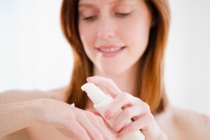By Dr Fernanda da Silva Tatley, PhD, MEntr
Questions and Answers with Fernanda
If you have any questions about skin care or skin care products, please feel free to ask them in the Comments section at the end of this article. Fernanda will answer the questions in a follow up article!
Plus read a great testimonial from an Azurlis customer here.
 Allergies to skin care products
Allergies to skin care products
Despite much research and development to formulate hypoallergenic skin care products there is always a small percentage of the population that presents with skin irritations and allergic contact dermatitis. However, the overall frequency of dermatitis produced by cosmetics is difficult to quantify.
For instance, in a recent released survey the USA FDA showed that up to 25% of those surveyed reported a skin reaction with at least one cosmetic product. Although, this does not mean that reactions to skin care products occur in 25% of the population, it suggests that they are relatively common.
Though most of the allergic reactions such as burning, stinging, or itching are transient, and can be resolved fairly simply by discontinuing the use of the product, the treatment of allergic dermatitis most often requires medical care. Besides, for those that present with an allergic reaction, the discomfort and distress are not to be underestimated.
So, it is always preferable to understand which types of ingredients have been known to have an allergenic profile, and needless to say, if you already know that you are allergic or sensitive to particular groups of substances, don’t use products that contain them.
Which ingredients are the most frequent allergens?
The top 4 groups of cosmetic ingredients with a known allergenic profile are:
- Fragrances
- Preservatives
- Hair colorants & agents for permanent waves
- Alpha-hydroxy acids and retin-A (tretinoin)
In a study published in 2008 (Matthew & al. Journal or Clinical & Aesthetic Dermatology, 1(41): 38-44) fragrances were identified the most frequent allergen in moisturizers, followed by the preservatives parabens and various forms of alcohols.
But, avoidance of specific allergens is often not straight forward as there are no standardized disclosure requirements across the board for the exact composition of the fragrances. Besides some synthetic fragrances can have very complex chemical profiles and both natural and synthetic fragrances can give rise to allergic reactions.
Natural fragrances are made exclusively of essential oils, but some of these can also be skin irritants, and sometimes their effect is only noticed on skin contact.
In sensitive people contact dermatitis and eczema can also caused by the preservatives that are added to extend product shelf life.
Examples of these preservatives:
Parabens, formaldehyde releasing preservatives, imidazolidinyl urea, Quaternium-15, DMDM hydantoin, phenoxyethanol, methylchloroisothiazolinone and benzyl alcohol.
Hair dyes can also cause skin reactions, especially those containing p-phenylenediamine as well as ammonium persulfate used to lighten hair. These reactions can present as burning, stinging, or itching without visible skin lesions.
Skin care products that contain alpha-hydroxy acids can also lead to skin reaction such as redness, swelling, blisters, and itching. Where possible avoid products that have an AHA level over 10%.
In our anti-ageing/anti-blemish conscious society ingredients like Retin-A are frequently used in anti-wrinkle as well as anti-acne creams and serum types. And, as effective as these may be, they are also known to cause irritant contact dermatitis in some people.
What to do to minimize allergic skin reactions:
- Read the ingredient list, and become familiar is the ingredients that are not necessary and may be potentially hazardous.
- Do a patch test on the inner fore arm prior to buying any product.
- Apply fragrances to your clothes, not your skin.
- Be aware that just because a product claims to be hypoallergic or non-irritant there is no guarantee that you’ll not have a reaction.









- 13 years ago
There are numerous anti-wrinkle products on the market. I don’t have wrinkles, but suffer with bags under the eyes – is there anything for these?